Framework for the Future of Indonesia's Digital Economy According to the 2024 Indonesian Presidential and Vice Presidential Candidates
The presentation of the vision and mission was represented by Wijayanto Samirin, Budiman Sudjatmiko, and Renard Widarto
How do the presidential and vice presidential candidates of the Republic of Indonesia see the importance of the digital economic sector? In the "Indonesia Digital Summit 2023" event organized by APINDO (Indonesian Entrepreneurs Association) on Tuesday, November 28 2023, the success team explained the digital economy vision and mission of each candidate.
DailySocial.id tries to summarize the things conveyed orally and in the presentation verbatim to serve as consideration for all readers.
Timses Anies Baswedan and Muhaimin Iskandar (AMIN)
The AMIN team was represented by Wijayanto Samirin. In his opening, he explained the paradox that exists in Indonesia today. He brought a number of examples, for example the difference in fate between students in Jakarta who can get internet connectivity of up to 50Mbps and students in Flores who can only be served with a 5Mbps connection.
Then there is also about a trader in Jakarta who was able to make big profits by using the platform E-commerce, while there are other traders in Central Java whose difficulties have actually worsened due to consumers turning to services E-commerce.
"Thirdly, I want to tell you about Deri, a young and successful investor because investing is easy, you can monitor it at any time using fintech legal. Meanwhile, in West Java, recently many honorary teachers were ensnared borrow illegal which makes his life even more miserable," said Wijayanto.
This disparity, according to Wijayanto, means that the digital economy cannot be enjoyed comprehensively by all levels of society. Departing from this spirit, AMIN believes that Golden Indonesia 2045 is not only about achieving GDP per capita of US$30 thousand, but about Indonesia having prosperity.
"Imagine when we land at the tip of Papua, in Kalimantan, Aceh, Java, we can feel that we are living in Indonesia, because the infrastructure is the same, the health facilities are the same," he added.
Seeing that the development of the digital economy cannot be stopped, AMIN believes that the digital economy needs to become a mindset that must be present in all policies. They do not want to think of the digital economy as a mere sector, but as a mindset development, and making collaboration the basis for getting around it.
AMEN Strategy
The AMIN Team divides the strategic agenda into two types of policies, namely general policies and policies per sector focus.
Regarding general policy, here are 5 points that will be AMIN's main agenda in welcoming digital economic progress:
- Providing regulatory certainty that facilitates innovation. One of the efforts that will be taken is to take action and impose strict sanctions on borrow On the other hand, regulations will also be designed to provide facilities or corridors for innovators. The key is to listen to those directly involved in the field.
- Improving the supply of digital talent and digital literacy in society. Digital literacy is considered an important foundation, so that society can protect itself against risks arising from the development of the digital economy.
- Encourage empowered Indonesian corporations/SMEs at home and abroad. This is aimed at facilitating protection policies, the government must be able to support the growth of local players without stopping competition from global players.
- Ensuring equal access and quality of digital services in Indonesia. Ensure that internet services and digitalization infrastructure can be accessed equally at the same price.
- Jack mindset digital in government circles, both central and regional.
The following are the strategic agenda points that AMIN will carry out to improve the digital economy from 5 main sub-sectors, namely on-demand, e-commerce, digital infrastructure, fintech, and media & entertainment.
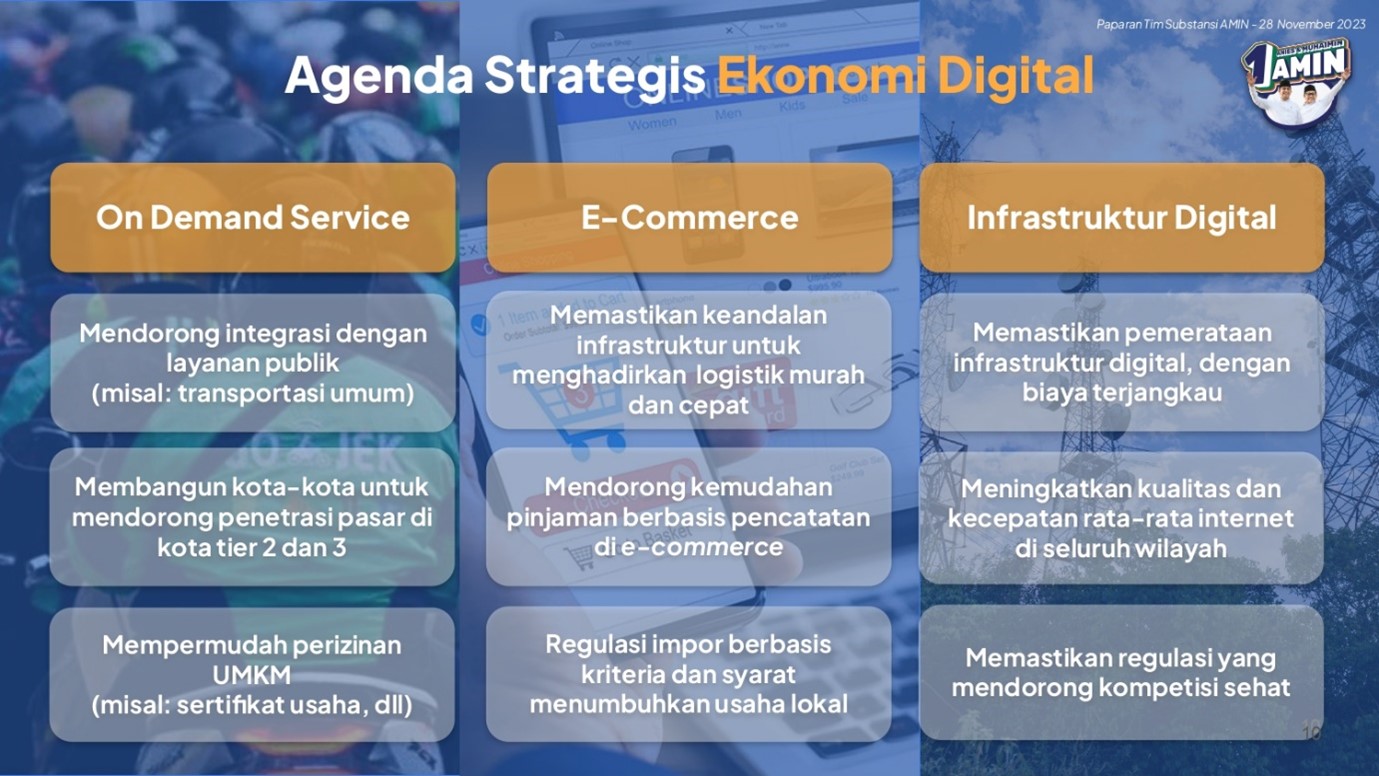
"We weekend fun shopping at E-commerce, but those in Papua think the shipping costs are expensive. So we have to push equity with equal access [...] Many people transact E-commerce but have no financial records. Actually notes from E-commerce can be used as tools to apply for credit at banking," said Wijayanto explaining one aspect of the sector E-commerce which AMEN will strive for.
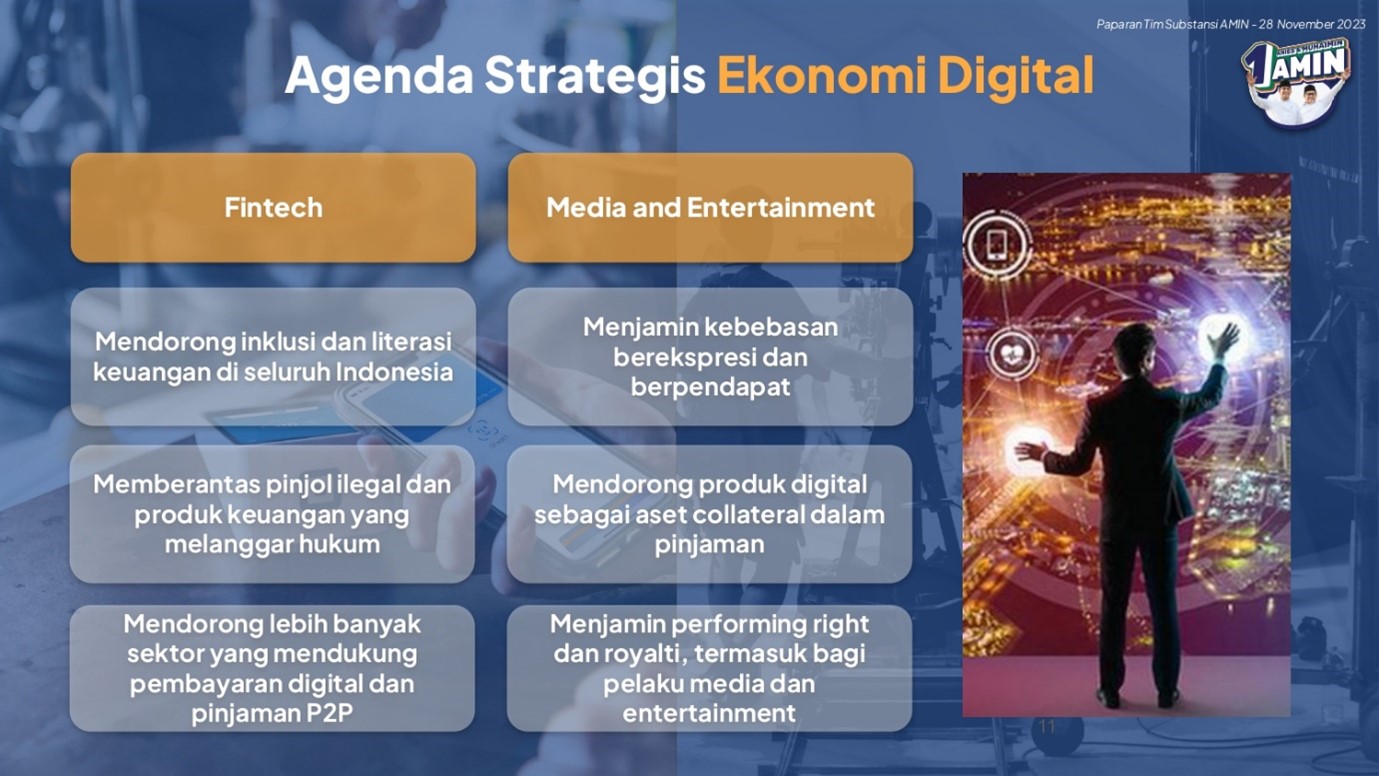
Team Prabowo Subianto and Gibran Rakabuming Raka
The Prabowo-Gibran team was represented by Budiman Sudjatmiko. In his presentation, he started by telling about a reality that recently occurred and became a general reflection of Indonesian society regarding digitalization.
"A 10 year old child in Pekalongan committed suicide because his parents scolded him, handphonehis request [...] A religious family and not a poor family. This shows that we still have a long way to go to develop the mentality of Indonesian people to live in the digital era. "And we know that the development of the digital era is exponential," he said.
Then Budiman told about the two countries currently in existence super power in the digital economy, namely the United States and China. The role of technology and digital is important in bringing the two countries forward. In the US, if there was no Silicon Valley in the manufacturing era, it is likely that the US would be unable to compete with Germany or Japan, whose manufacturing was more advanced at that time. Meanwhile in China there is great interest in developing technology nano, quantum, to Biotech also brought it to become the developed country it is today.
Prabowo-Gibran Strategy
Budiman explained that one of the keys to digital economic architecture is changing the mindset from just prioritizing "service" to "experience". According to him, if you only focus on creating services, adoption will only be limited to 2-3 human senses. Meanwhile, if you can touch on the experiential aspect, then digitalization can have a direct effect on the user's brain when they interact with the digital service itself.
“And victory within race "The digital industry depends on the speed at which we incorporate that experience into every aspect of digitalization," said Budiman.
Apart from trying to shift the focus to experience, there are things that also want to shift the understanding. Budiman said that up to now, most of us have considered the digital world to be limited to applications --- even though to truly master that world requires mastery of other layers, including hardware and networks. This optimization between applications, networks and hardware must be an important consideration for future digitalization strategies.
Concretely, the methodology that will be applied is "community driven innovation", namely by encouraging everything stakeholder in the digital ecosystem to work together to create a healthy innovation climate. If they win, the Prabowo-Gibran government wants to encourage business innovation while reducing the knowledge gap. This knowledge gap is emphasized, considering that according to Budiman we are currently in knowledge-based economy.
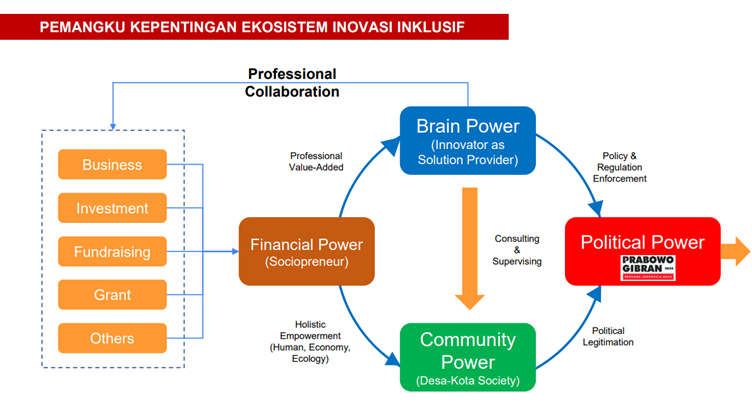
“This is also concerning supply and demand. On the side supply we can produce digital talents (developers, AI engineer etc) this is all a technical issue. But on the side demand, we have to be able to create a market, and this is a matter of politics, even geopolitics. "This is also a matter of economics, even geoeconomics," added Budiman.
In particular, there are 5 main goals and objectives of the Prabowo-Gibran team in relation to the development of the digital economy, namely:
- Creation of added economic value.
- Data security.
- Fairness of access.
- Increased collective intelligence.
- Increased mastery of technology.
To realize this mission, Prabowo-Gibran believes that the first initiative must start by creating an "analog container". This will be designed with great care, because without proper handling it can have social, economic and political impacts that are less relevant for Indonesia as a nation. Therefore, the formation of IKN (National Capital) is important as an analog forum which will later become the center of the digital ecosystem.
Later, 10 innovation cities will be built spread across various islands in Indonesia - with each city having a deep focus on research and development in certain fields. Not only that, 10 virtual cities (metaverse) are also planned to support the future of the digital economy. These cities are westernized into planets that will travel around the solar system, with IKN as the sun.
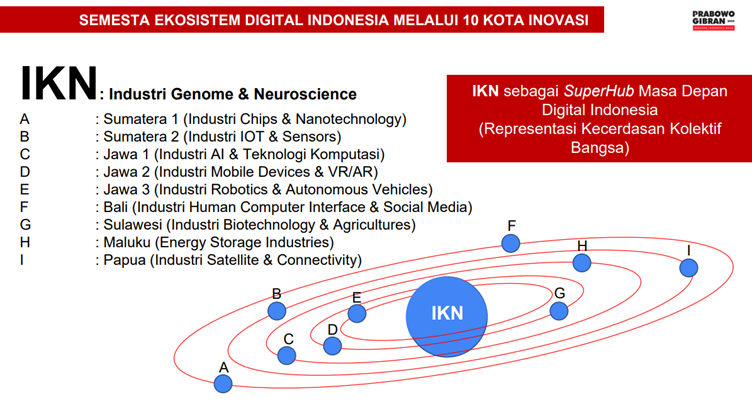
Budiman is quite confident that this initiative can work, because he sees that the human resources are actually ready. Many overseas graduates are underutilized when they return to Indonesia – later they will be directed to become part of the development of this digital ecosystem.
To make these cities sustainable, a number of business models have also been designed. Some of these are in the form of land-based businesses, activities, innovation and distribution. The total investment to build this ecosystem is projected to reach IDR 125 trillion or the equivalent of $8,6 billion with a projected ROI of IDR 230 trillion or $15,9 billion in 10 years. And this initiative is estimated to absorb more than 2,8 million local workers.
Each city is estimated to require an investment of nearly $1 billion, with details of $557 million for infrastructure development and $460 million for supporting facilities. Later there will be 5 goals main things to be achieved, in order to ensure Indonesia is at the forefront in the fields of: semiconductor, energy storage, quantum AI, biotech, and nanotech.
For market absorption, market optimization among villages (with the support of village funds), cooperatives, and 128 million people in Indonesia is expected to be eraly-adopter of these digital innovation products/services.
Regarding human resource development, several issues need to be resolved. Starting from English language skills, self-confidence and mentality, communication skills, device support, government participation, culture, to the latest technological capabilities. Handling this challenge will be realized in 87 programs, including the program joint-degree local and international campuses, nutrition programs for pregnant women, superior schools in each district, and so on.
Team Ganjar Pranowo and Mahfud MD
Starting the presentation entitled "Digital Economy as a Generator of Growth Towards an Advanced Indonesia", Renard Widarto, representing the Ganjar-Mahfud team, discussed the enormous potential value of Indonesia's digital economy.
Quoting data from the Ministry of Cooperatives and SMEs, the value of our country's digital economy in 2023 is projected to reach IDR 4.531 trillion. Validated by Google, Temasek, Bain&Company data, this economic value is equivalent to 40% of total digital transactions in Southeast Asia. So this potential cannot be underestimated and must be optimized as a new economic force that drives the Indonesian economy as a whole.
Ganjar-Mahfud Strategy
Assisted by young people who have entered the digital industry, the Ganjar-Mahfud national winning team formulated 4 aspects that will form the basis of their strategy in their vision and mission to work on this new economic power, as follows:
- Human Resources Aspect.
Renard said that regarding HR there are two important philosophies that must be observed. The first is related to efforts to encourage digital literacy in society. According to him, there is only one way, namely by improving the quality of public education. The affirmative action taken must be able to increase the achievement index (for example PISA scores) – and the Ganjar-Mahfud team has designed a program to make education free from PAUD to SMA, plus one bachelor's degree for one poor family.
The second philosophy focuses on encouraging and facilitating so that the nation's children can master knowledge in the digital field and information technology. The aim is to produce more experts in the fields of artificial intelligence, digital security, etc. with global caliber. In encouraging this initiative, Ganjar-Mahfud will optimize the research function, by allocating a budget for research of at least 1% of GDP.
“Today we can be concerned because the number of our researchers, in a ratio of one million population, is only approximately 1/6 of that of Malaysia. "Intelligent human resources and digital experts are non-negotiable, because this must be part of a series in preparing Indonesia's digital economic growth to be optimal," said Renard.
- Digital Infrastructure
In this aspect, Renard also explained that there were two important things to pay attention to. The first is related to the internet which must be easy, cheap and fast – he said with tagline “SEMBAKO” (Everyone Can Connect). Judging from the average speed, the internet in Indonesia is still far behind compared to a number of neighboring countries. So it is important for the future government to pay special attention to how to optimize internet services – which is a basic need in the digital economy.
More Coverage:
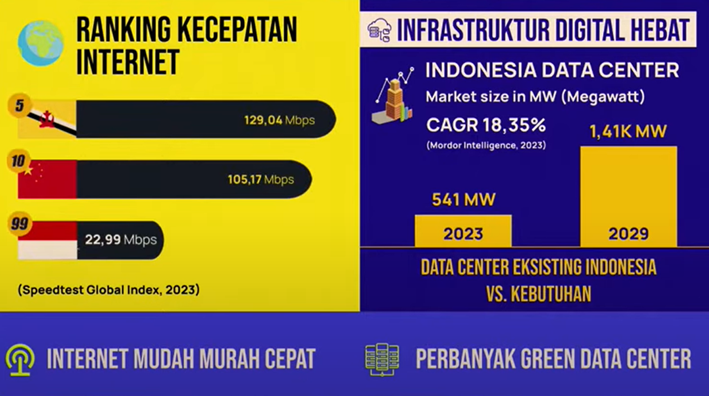
Second is the problem data center. Currently, Indonesia's capacity can only accommodate 1/3 of the total demand in 2029. Apart from being an effort to encourage the technology industry to be more independent, it is actually development data center It could also be a solution to the 44% electricity surplus in the Java-Bali area which is currently owned by PLN. Of course, Renard also underlined that the development of data center infrastructure like this must be designed using green energy principles with renewable energy.
- Digital Industrialization
Digital industrialization is considered important because this digital economy really must be able to create new economic power for Indonesia. Don't let digitalization just be a form of transformation or movement from a conventional economy to a digital one. For this reason, the government needs to take part in ensuring that in this digital economy there must be a role for the nation's children, not only as consumers, but also involved in every value addition in all links of the chain.
"With this digital industrialization, we can dream that one day we will have a domestic brand cellphone or laptop that can be compared globally. From low tech to high tech, industry hardware"It's done domestically," said Renard.
In order to encourage this industrialization, our young generation must be supported so that they can produce artificial intelligence, applications and other digital products that are world competitive. The government must be present, one of which is through a ready-to-work curriculum and capital.
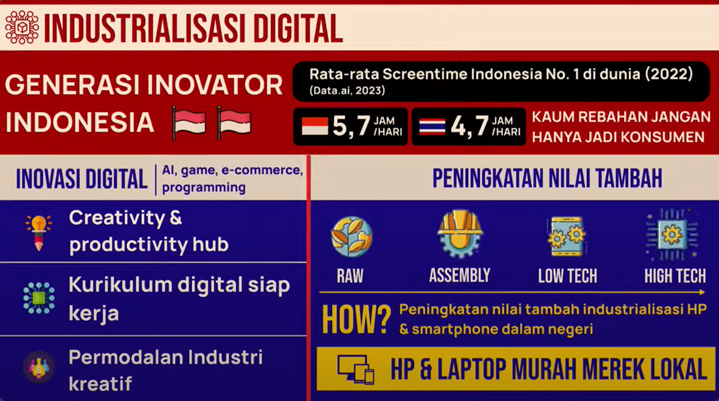
- Digital sovereignty
Once the three aspects above are fulfilled, then what must be pursued is digital sovereignty. This is an indication of a self-sufficient and independent ecosystem. The government must be present to ensure that digital sovereignty continues to occur, by issuing appropriate regulations. And Ganjar-Mahfud will issue a number of policies. First, protection against intellectual property (IP) and personal data. Second, encourage all digital transactions to take place in Rupiah.
"From the investment process to the smallest micro buying and selling transactions, everything must be in Rupiah and placed in domestic banks. We have to shift the paradigm, don't let startups get large investments not in Rupiah and the funds are not kept domestically. "So our digital economy must be able to encourage the strengthening of the value of our own currency," explained Renard.
And third, the government will create fair digital economic regulations, such as protecting the public from predatory pricing as is often the case nowadays.
Through the 4 strategic agendas above, the Ganjar-Mahfud national winning team believes that 7% economic growth is not just wishful thinking, but is a necessity that can be optimistically achieved with the digital economy as one of the generators.
Sign up for our
newsletter
